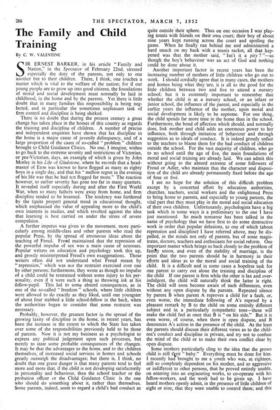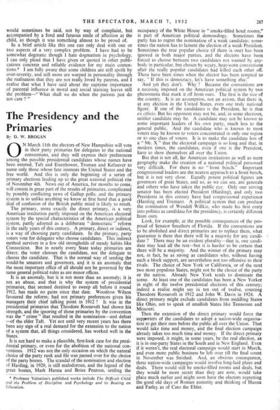The Family and Child Training
By C. W. VALENTINE SIR ERNEST BARKER, in his article " Family and Nation," in the Spectator of February 22nd, stressed especially the duty of the parents, not only to one another but to their children. There,- I think, one touches a matter which is vital to the welfare of the nation; for if our young people are to grow up into good citizens, the foundations of moral and social development must normally be laid in childhood, in the home and by the parents. Yet there is little doubt that in many families this responsibility is being neg- lected, and in particular the sometimes unpleasant task of firm control and discipline is being shirked.
There is no doubt that during the present century a great change has taken place in the homes of this country as regards the training and discipline of children. A number of precise and independent enquiries have shown that lax discipline in the home is a major cause of juvenile delinquency, and of a large proportion of the cases of so-called " problem " children brought to Child Guidance Clinics. No one, I imagine, wishes to go back to the extreme severity and restrictions of Victorian, or pre-Victorian, days, an example of which is given by John Morley in his Life of Gladstone, where he records that a head- master of Eton was known to have flogged as many as eighty boys in a single day, and that his " mellow regret in the evening of his life was that he had not flogged far more." The reaction however, to earlier severity has gone too far in many quarters. It revealed itself especially during and after the First World War, when so many fathers were away from home, and firm discipline tended to be lessened. The tendency was furthered by the (quite proper) general trend in educational thought, which emphasised the value of appealing more to the child's own interests in studies, and which revolted against the idea that learning is best carried on under the stress of severe compulsion.
A further impetus was given to the movement, more parti- cularly among middle-class and other parents who read the popular Press, by the spread of erroneous ideas about the teaching of Freud. Frew/ maintained that the repression of the powerful impulse of sex was a main cause of neuroses. Popular writers on education and psychology took this up, and grossly misinterpreted Freud's own exaggerations. Those writers often did not understand what Freud meant by " repression," which was not the restraint exercised over one by other persons; furthermore, they wrote as though no impulse of a child could be restrained without some injury to his per- sonality, even if it were such a thing as throwing ink at his -fellow-pupil. This led to some absurd consequences, as in one of the so-called " freedom " schools, where little children were allowed to do exactly as they liked, until one youngster of about four stabbed a little school-fellow in the back, when the authorities began to consider that some restraint was necessary.
Probably, however, the greatest factor in the spread of the growing laxity of discipline in the home, in recent years, has been the increase in the extent to which the State has taken over some of the responsibilities previously held to be those of parents. Now it is not my business as a psychologist to express any political judgement upon such processes, but merely to state some probable consequences of the changes. It may be that the advantages to the home, and to the children themselves, of increased social services in homes and schools greatly outweigh the disadvantages; but there is, I think, no doubt that one grave danger is that many parents tend to feel more and more that, if the child is not developing satisfactorily in personality and behaviour, then the school teacher or the probation officer or the Child Guidance Clinic is the one who should do something about it, rather than themselves. Some parents, indeed, seem to regard a child's bad conduct as quite outside their sphere. Thus on one occasion I was play- ing tennis with friends on their own court; their boy of about nine years kept running across the court and spoiling the game. When he finally ran behind me and administered a hard smack on my back with a tennis racket, all that hap- pened was that the mother said, " Isn't it a pity ? "—as though the boy's behaviour was an act of God and nothing could be done about it.
Another important factor in recent years has been the increasing number of mothers of little children who go out to work. I should cordially agree that in many cases, the mothers and homes being what they 'are, it is all to the good for the little children between two and five to attend a nursery school; but it is extremely important to remember that whether the child is at a nursery school, or an infant or junior school, the influence of the parent, and especially in the earlier years the influence of the mother, upon moral and social development is likely to be supreme. For one thing, the child spends far more time in the home than in the school. Furthermore, the bond of affection which should, and normally does, link mother and child adds an enormous power to her influence, both through imitation of behaviour and through suggestion as to ideals of conduct. It is indeed grossly unfair to the teachers to blame them for the bad conduct of children outside the school. For the vast majority of children, who go to no school until the age of five, the main foundations of moral and social training are already laid. We can admit this without going to the absurd extreme of some followers of Freud or Adler, who maintain that the character and disposi- tion of the child are already permanently fixed before the age of four or five.
I see no hope for the solution of this difficult problem except by a concerted effort by education authorities, churches, teachers, social workers and the enlightened Press to bring home to parents, and especially to young parents, the vital part that they must play in the moral and social education of their own children. Unfortunately, psychologists have a big task which in some ways is a preliminary to the one I have just mentioned. So much nonsense has been talked in the name of psychology that we have first to do some destructive work in order that popular delusions, to one of which (about repression and discipline) I have referred above, may be dis- pelled, in the minds not only of _parents, but of some magis- trates, doctors, teachers and enthusiasts for social reform. One important matter which brings us back closely to the problem of famAy union, and even of the stability of marriage, is the point that the two parents should be in harmony in their efforts and ideas as to the moral and social training of the child. It is a difficult and in some cases a hopeless task for one parent to carry out alone the training and discipline of the child. If one parent is firm while the other is lax and over- indulgent, the child will naturally think the latter is right. The child will soon become aware of such differences, even without any open dispute by the parents. Repeated silence by parent B when parent A reproves a child for a fault, or, even worse, the immediate following of A's reproof by a pleasant remark by B to the child on some entirely different subject and in a particularly sympathetic tone—these will make the child feel at once that B is " on his side." But it is even worse, of course, when there is open dispute, and B denounces A's action in the presence of the child. At the least the parents should discuss their different views as to the child- ren's conduct and discipline in private, and try not to confuse the mind of the child or to make their own conflict clear by open dispute.
Some mothers particularly cling to the idea that the grown child is still titeir baby." Everything must be done for him. I recently had brought to me a youth who was, at eighteen, still so completely dependent on his mother, and so aggressive or indifferent to other persons, that he proved entirely unable, on entering into an engineering works, to co-operate with his fel/ow-workers, and the work had to be given up. I have heard mothers openly admit, in the presence of little children of eight or nine, that they were unable to control them; and this would sometimes be said, not by way of complaint, but accompanied by a fond and fatuous smile of affection at the child, as though it was something almost to be proud of.
In a brief article like this one can only deal with one or two aspects of a very complex problem. I have had to be somewhat dogmatic though I hate dogmatism in psychology. I can only plead that I have given or quoted in other publi- cations concrete and reliable evidence for my main conten- tions.* I am fully aware that some children are still spoilt by over-severity, and still more are warped in personality through the realisation that they are not really loved by parents, and I realise that what I have said about the supreme importance of parental influence in moral and social training leaves still the problem—" What shall we do when the parents just do not care ? "



































 Previous page
Previous page